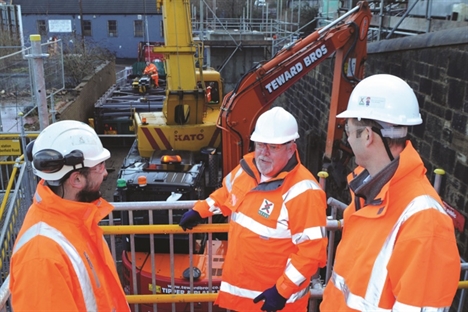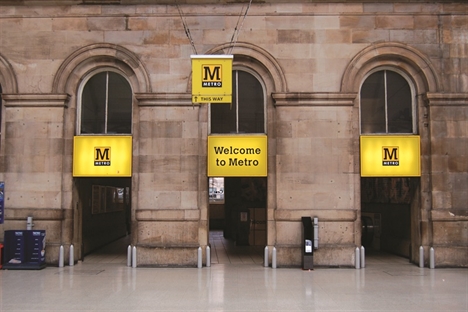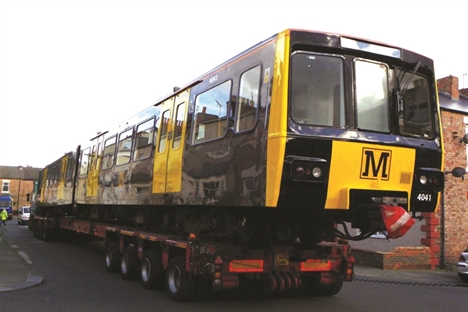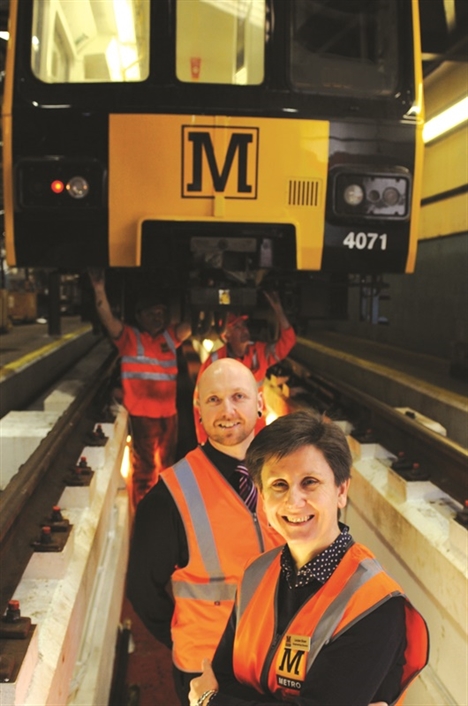14.03.14
Bringing contracts back in-house
Source: Rail Technology Magazine Feb/Mar 2014
The ‘Metro: all change’ programme in Tyne and Wear is entering its fourth year – with attention on the £389m scheme shifting from disruptive track works to behind-the-scenes improvements, while the rolling stock refurb hits its halfway mark. RTM spoke to Nexus director of rail infrastructure Raymond Johnstone.
After years of major track and station works to modernise the Tyne & Wear Metro, with major weekday disruption as a consequence, this year the focus is more on the communications and safety systems.
But there are changes in the ways that passenger transport executive Nexus is delivering the work, too, with a bigger emphasis now on in-house delivery and less on external contracts.

Raymond Johnstone, Nexus’s rail infrastructure director, explained that some previous contracts were “just unaffordable”, hence its decision to internalise much of its signalling and fibre-optic cable renewal work around the network 18 months ago. Financially, that has proved a smart way to go.
Johnstone explained: “Just over a year ago we set up our in-house Capital Delivery Team, about 60 posts, and that’s been a real success story. We looked at the market rates we’d got from the previous frameworks and compared that to an in-house facility. We produced a business case which concluded that if we continued to go externally to the marketplace, it was going to cost us about £24m. If we internalised it was likely to cost about £16m.
“We’ve since refined that, and got a bit more sophisticated, and our latest forecast is that work is likely to outturn around £11m – even lower than we first predicted. That’s because we’ve got smarter as we’ve gone on.
“Evidently we won’t be able to do that in every single asset category: there are some capabilities which we will just never possess in Nexus, and we are the first to recognise that, and nor could we do it efficiently.”

(Image above copyright Matt Thorpe)
Dealing with OLE skills shortages
In 2010, Nexus awarded framework agreements to Balfour Beatty Rail Limited, BAM Nuttall, May Gurney, Serco and Morgan Sindall for the delivery of the ‘Metro: all change’ programme, with those five contractors conducting mini-competitions for individual packages of work. Volker Rail has also undertaken work on the programme.
Johnstone said: “Like any other relationship with any contractor, you get good ones and you get not-so-good ones. We’ve had a lot a success and a good collaborative relationship with Balfour Beatty Rail, for example, and they’re continuing to do some work with us.
“But now we’re giving serious consideration to [internalising] our overhead line replacement. That’s partly because we’ve got to think about what’s happening outside of the Tyne & Wear Metro. The rail market is quite buoyant right now, and there are a lot of skills shortages. For example, there’s forecast to be an acute shortage of overhead linesmen over the next 10 years. So if you’re a fairly small customer like ourselves, you’re not going to get the big players interested. We’re currently evaluating this, both economically and in terms of whether the market is likely to respond to us for overhead line renewals. We need about 88% of our overhead line equipment renewed in the next decade. We’re currently judging whether it’s sensible to go out to the market – or more sensible to internalise that.
“A lot of our current contracts are naturally coming to their end – though the signalling one wasn’t like that, it was just unaffordable. We did have three signalling framework contractors, all of whom were good, but we just couldn’t afford going down that particular road.”
Communications upgrade
Metro is usually referred to as a light rail system, though it also has many elements in common with heavy rail. It is currently upgrading its radio system, for example, but will comply with RSSB group standards because DB Regio Tyne & Wear (which operators Metro on behalf of Nexus) also goes onto Network Rail’s infrastructure.
It is replacing its life-expired radio system with a new TETRA system. Johnstone told RTM: “The radio system we have is obsolete. In terms of quality, it still functions reliably, but you’ve always got to keep ahead of the game when it comes to essential kit like radios. We’re currently evaluating the responses the market have given us.”
A contract award decision is expected in March or April, then once the design element of that contract is secured, it will be time to start the design and build phase of the upgrade of Metro’s train control system, PTI (Positive Train Identification), similar to ARS (Automatic Route Setting) as used by Network Rail.
Johnstone said: “Our system is obsolete and cumbersome in terms of being able to change the codes and to use it as flexibly as we’d like, so it’s definitely time for renewal for a whole host of reasons. It does more than ARS; it drives our passenger information systems and our performance management systems, so it’s got a lot of dependencies. We’ve done a feasibility study, and it will physically link into the radio system.
“We envisage going out to the market around January/February 2015.”
Leaves on the line
There will also be a major programme of vegetation clearance, on a bigger scale than previous years following extensive disruption last autumn. Johnstone admitted: “We haven’t yet fully concluded why autumn 2013 was so bad for us. In terms of delay, we saw five times more than ever before, and yet our approach was fairly consistent with previous years.”
Nexus’s approach has been to use a Sand Truck (converted Land Rover) vehicle applying citra gel, a solvent that breaks down leaf mulch on the lines. Metro trains use a track brake system, meaning low rail adhesion isn’t a major safety issue – trains cannot just slide past a signal at danger, for example – but it does affect performance and reliability.
Its vehicle can only currently get out on the tracks during engineering hours, not during passenger traffic, but Nexus is about to take delivery of a new tamper from Plasser & Theurer without that restriction. Johnstone said: “We’ve got the luxury of having quite a lot of space in that new vehicle because of our axle loading – we’ve got to have an extra axle so it’s longer than what you would normally associate with a tamper of that type. We’re planning to use it as our equivalent of a Network Rail MPV (multi-purpose vehicle), so we’re going to put a water jetting facility on it, and traction gel nozzles.
“We can run that train outwith our four-hour engineering window, and can run it among our early morning trains, like Network Rail does. That affords us the opportunity to make a step change in how we address the problems that come with autumn.
“We needed a new tamper able to do both plain line and S&C, and our new tamper has also got a ballast brush. We’re trying to sweat the asset by putting as much functionality into it as possible.”
Rolling stock
Metro’s rolling stock is undoubtedly ageing, though it is now halfway through a £30m refurbishment programme to extend the trains’ lives as much as possible.
Wabtec is doing the ‘three-quarter-life’ refurbishment work at Doncaster, and has just returned the 43rd Metro car back into service, leaving 43 still to go.

Each car has been stripped down to its frame and built back up again, with improved disabled access, replaced door control systems, new painting and livery, upgraded interiors and seating, new lighting and new drivers’ seats.
The livery is now light metallic grey and black, incorporating the bright yellow Metro brand colouring, replacing the ‘red, green or blue’ Metro train liveries dating to the mid-1990s when the fleet underwent its half-life refurbishment.
Louise Shaw, engineering director at DB Regio Tyne and Wear (pictured below with project manager Chris Vinnicombe), said: “We first began the project to refurbish the existing fleet in 2010 and have come a long way since then, with half of the trains having now undergone an extensive update. A variety of members of staff have worked tirelessly in different ways to help us reach this point and will continue to do so until all Metro cars in the fleet have received the planned improvements and innovations.
“Feedback from customers regarding the new trains already in circulation has been extremely positive and we are now focusing on refurbishing the remaining cars, to help ensure all passengers receive a reliable and comfortable journey with Metro, in the future.”
In the long term, Metro will need a completely new fleet – but the way it will go about that, and its strategy, remain under wraps for now.
Skills
Johnstone said Nexus is determined to invest in the skills and capability of local people, with the creation of the new posts for the CDT just the start. It has also been putting 60 frontline supervisors through its ‘frontline leadership programme’ over two years, giving them an ILM (Institute of Leadership & Management) Level 3 qualification.
About 25 people have been doing a diploma in management studies too. Johnstone explained: “Unless we have really capable managers, a lot of the investment we make would not be as efficiently used as it would be if the skills of our managers are up to scratch.
“It’s about [management skills for our] project managers as well, who have typically come through our graduate scheme. They’ve got big, important jobs delivering key parts of this programme for us.”

Renew, refurbish and replace
Other ‘Metro: all change’ works to be carried out during 2014 include:
• Replacement of CCTV cameras and the public address system
• Track and drainage renewal at Shiremoor and Whitley Bay
• Station improvement work at Northumberland Park, Simonside and Pelaw
• Overhead line replacement between Heworth and Hebburn
• Completion of work to install lift at Walkergate to replace the steepest ramp on the system.
• Work starts on refurbishment of Hebburn, Jarrow and Bede stations
• The last two escalators to be replaced at Gateshead Interchange